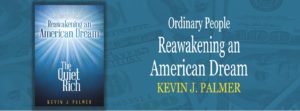On a Thanksgiving trip back east to my parents’ home a few years ago I listened to my father’s version of how our country’s social values have embarrassingly declined. “People today,” he said, “can’t create new wealth without the help of corrupt schemes.”
I sensed sadness in his voice. The lessons he and Mom taught us were based on treating others the way we wished to be treated. If we did, we’d inherit the earth and all that is in it. Of course, my parents’ advice was overridden with realities about how to gain that just place in the world. We were told to expect nothing for free and work hard for our dreams. Reaching them any way except through the esteemed moral values with which we were raised would not be acceptable.
It was no surprise that, on balance, my siblings were motivated to teach, nurse, and serve the community. Even the two sons employed with large corporations keep a sense of loyalty to the greater good—the good based on the missions of those respected firms.
During our turkey dinner, my father and I discussed how America’s biggest companies were touting incomprehensible profits, CEO bonuses as big as lottery winnings, and billion-dollar government bailouts paid for with taxpayer money. At the time, I had recently retired from an NYSE member firm. I’d learned that the slogan printed on its coffee cups wasn’t the way people conducted business there. Dad’s opinions were valid.
Because of my previous corporate pride, I hesitated slightly, but then I politely acknowledged what he said. But to keep my conscience clear, I reminded Dad that even though we hear about super-rich individuals gaining wealth on the backs of those barely managing to stay afloat, more people were quietly prospering even in these cruelest of times. And they were doing it in honest ways. In fact, many ordinary men and woman I uncovered during my research at a behavioral-economics firm had based their paths on old-fashioned ethical standards.
Dad acknowledged that a lot more people had more money today than when he started his family. And he reticently admitted that his and my mother’s teachings may not have done his family justice because they omitted the eye-for-an-eye, tooth-for-a-tooth lessons of business. Perhaps that omission had denied us a fair chance against the unscrupulous members of our society.
“I don’t begrudge John next door for having a Cadillac,” Dad pushed back, not entirely convinced. “I’m happy with my Chevy. But I’m not sure that macroeconomic events like a secular bull market or the expansion of unprecedented real-estate ownership in the fifties factored into certain people having more money than others.”
My mom interrupted to passionately assure us, “We’re all fine, and we have the most important things life can provide—a loving family, good friends, and God to protect us.”
Reflecting on our conversation, I thought Dad’s opinions were correct. However, his sense of regret and uncharacteristically cynical attitude compelled me to take a meticulous look at people who had started with an average or below-average net worth and yet surpassed almost everyone else. They did this despite the macroeconomic climate and without compromising their values of hard work and decency.
This issue moved me deeply. I knew I wanted to improve the human condition by applying my expertise to help everyone achieve their version of the American Dream. Yes, everyone, not only those in the top percentiles of our population.
Growing Up on an American Dream
The community in which I was raised was like thousands across this great country. It had an interesting mix of white-collar and blue-collar families, and everyone seemed to have enough of a piece of the American Dream to feel content. If someone was in need, people came together to help. Our neighborhood might have been considered an affluent bedroom community of New York City, but no one seemed to feel entitled or economically and socially prejudiced. There was never talk about who was welcome—or not welcome—to live there. People would fit in by being a responsible part of the community’s character.
This town of hardworking, connected people produced famous and not-so-famous offspring. I’m sure we all remember it as a great place to grow up. People there, like citizens of many similar towns, based success on simple honesty and the hard work that ran an engine of economic activity that powered America to become the world’s greatest nation.
Crossing the Economic Rubicon
Today, much of that has changed. When I visit my home town and places like it, I see communities that have become more about “where I live” and “how much Imake,” regardless of how—or if—the neighbors are surviving.
The economic Rubicon, it seems, has become the billionaire headline-grabbers whose fortunes were predicated on getting moms and pops to invest their life savings. They’re not the millions of families who quietly work toward a kind of dream-come-true prosperity. Missing are the amazing stories of financial independence that forms the cornerstone of economic prosperity. From my roots, I knew of countless people who used their own notes, octaves, and melodies to make rich music in uniquely quiet—yet enormously prosperous—ways.
That’s not to say Dad was wrong when he said people today couldn’t create new wealth without the help of corrupt schemes. The grinding greed of one-upmanship has also produced many a millionaire. Listen to a news story and you can bet you’ll hear of a debacle about wealth gone bad due to rogue or malevolent practices.
Fortunately, on balance, wonderfully simple stories of success are plentiful. Although they’re rarely talked about in the media, people who have such stories make up an expansive segment of the wealthiest population in America. They demonstrate it’s still possible for average folks to become financially victorious in any economic climate by living the lessons their families taught them as children.
Spiritual Wisdom at the Core of Human Greatness
People have indelible potential to do great things. They have the ability to realize a destiny of being quietly rich—a quality that’s born from free will and a unique spirit. For more than two thousand years, spiritual leaders such as Jesus and Muhammad and spiritual pathways such as Buddhism and Taoism have echo ethical standards for a fruitful life. These standards still apply to modern times, and they have proved to be highly effective for those who take a higher road to success by employing a new testament to wealth.
In the consciousness of humankind, success from spiritual wisdom is at the core of true human greatness. The proof lies in the amazing stories of contemporary success in the pages of this book. Their characters represent hundreds of likeminded people with different personality types who explored their spiritual uniqueness and created a righteous path to riches.
Dreams Buttressed by the Most Dynamic Capitalism in History
In the United States, our freedoms of speech and the press and the right of the people to peacefully assemble were intended to “secure the Blessings of liberty to ourselves and our Posterity.” This is an underlying precept of an American’s right for financial independence.
Intended or not, idealistically fair values were interlaced into the fabric of this nation’s founding documents as a driving force that helped make this country great. They exist so all who step onto this land can rightfully quest for their own American Dream.
Some may deny the powerful principles that shaped the dream of our founders and the subsequent economic greatness their beliefs sowed. But the formula remains a fact—that is, wealth can be created without treading on others, by harnessing an individual’s strength of personality in a way consistent with his or her conscience.
By reading The Quiet Rich Ordinary People Reawakening an American Dream and applying the success standards found within, you can push back the roiling arena of public opinion and proclaim that growing rich is your inalienable right.
End Wealth Inequality in an Honorable Way. Available now by visiting:
http://www.barnesandnoble.com/w/the-quiet-rich-kevin-j-palmer/1121892552?ean=9781504326650
http://www.amazon.com/Quiet-Rich-Ordinary-Reawakening-American/dp/1504326652
Stop obsessing about the “millionaires on steroids” and celebrate those quiet people who make up the majority of the wealthy population that’s driving our economy. They’re the ones who, as my dad once reminded me, embody the American values this country was founded on—hard work, honesty, and self-improvement.
Kevin J. Palmer
The Quiet Rich


